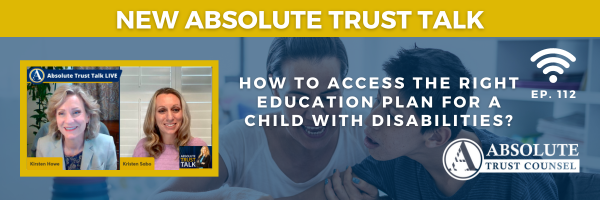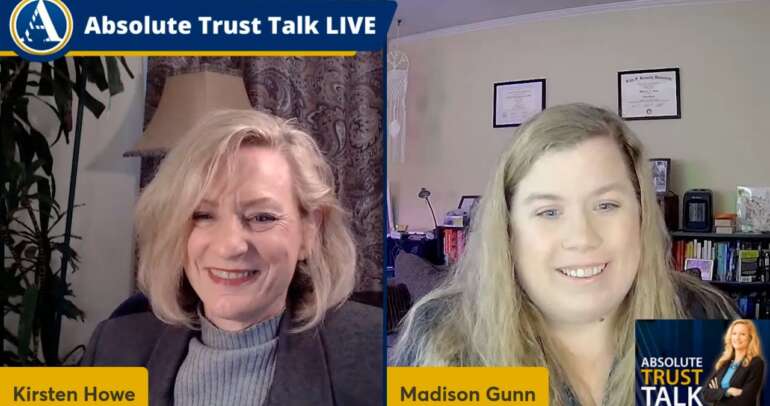Education can open many doors in life, but if you’re the parent of a special needs child, it may seem like those doors are not only closed but padlocked, leaving you and you alone to chart the educational course for your special needs child.
Nearly a half-century ago, the Education for All Handicapped Children Act, which became the Individuals with Disabilities Education Act (IDEA), guarantees a free and appropriate public education for students with disabilities. Yet to this day, many parents and guardians of special needs children don’t know how to access the services at their disposal because of this Act, nor do they even realize they’re available.
In this episode of Absolute Trust Talk, our guest will clear up some confusion surrounding this critical and complex topic. Kirsten Howe will speak with education consultant Kristen Sabo of National Care Advisors, who advocates for special needs children and connects them with the services they need to fully access their education — services guaranteed to them under federal law. Kristen has spent years working with school administrators, board members, families, and special needs students themselves, so she knows better than anyone just how impactful an effective educational team can be on the life of a child with disabilities. Throughout this discussion, you’ll hear Kristen emphasize the importance of a collaborative, individualized approach to getting her clients the best possible educational outcome, as every special needs child has their own unique academic challenges. Join us as we discuss:
- The most common roadblocks that stand in the way of parents or guardians seeking the free and appropriate public education for their child that they’re entitled to by law.
- What factors impact a child’s Individualized Education Plan (IEP), how it is deemed appropriate for the student, and why it must change over time as the child matures?
- How Kristen’s role differs markedly from that of an attorney, and why her approach — which emphasizes collaboration and a positive long-term relationship among parents or guardians, the school district, and the special needs student — can foster proactivity that will serve the best interests of the special needs student.
- The variety of special needs services that might be needed and how those services can improve or hinder the effectiveness of an IEP depends on the student and their needs.
And more!
All children, including children with disabilities, are legally entitled to a free education in this country. Our goal in this episode is to help you walk away with a better understanding of the support programs available and how to access them as needed if your child or a child you know is struggling with their educational path.
Big Three from Episode #112:
- The Education for All Handicapped Children Act, which became the Individuals with Disabilities Education Act (IDEA), has existed for nearly 50 years. It guarantees a free and appropriate education for any child with disabilities, but parents and guardians of special needs children often don’t take advantage of its benefits. This inaction usually stems from one of two causes: 1) The parents or guardians don’t know about IDEA or what it entails, or 2) Even armed with this knowledge, they’re often overwhelmed and don’t really know what kind of help to ask for.
- While public schools are legally required to provide either the accommodations or services a special needs child requires to fully access their education, obtaining these benefits can be very difficult. Often, the school district will fall back on the excuse that a child is “non-educable,” which, over time, may cause many parents to avoid enrolling their special needs children back in school. The first step to obtaining the best possible free and appropriate education for any child is always enrollment so that the proper assessments can lead parents, teachers, and administrators to determine what special needs services or accommodations disabled children might need in order to achieve the best possible educational outcome.
- As a disabled child matures, their educational needs will change. The Individualized Educational Plan that determines the services and/or accommodations they will receive must be revisited and adjusted regularly — at least once a year. However, parents and guardians can request a review of the IEP as frequently as they believe is necessary. The fallout from Covid caused many special needs children to miss these reassessments and fall behind — especially those who had been home-schooled during the pandemic and delayed returning to the classroom setting.
Time-stamped Show Notes:
0:00 Introduction
3:26 Awareness is number one! And usually why, guardians of children with disabilities don’t attempt to access the services needed.
4:10 The Individuals with Disabilities Educations Act (IDEA) guarantees a free and appropriate public education for individuals with disabilities, but its wording is often subject to interpretation.
5:09 Kristen discusses the beginning stages of working with students once they are perceived to have a disability.
6:32 Despite what parents of a child with disabilities may be told, it’s vitally important that they enroll in school. They CAN be educated!
8:23 Understanding what type of services are needed for the student to be successful and access their education is the guiding principle for programming.
9:47 No two disabled children are alike. Every case will be different. Listen in as Kristen shares more insights on assessing specific needs.
10:35 The moment the parents and guardians sign a consent to evaluate, the clock starts ticking for a school district to begin the assessment of a child’s educational needs and come up with solutions.
12:44 Having 15-20 experts telling you what your child needs can be overwhelming and underscores the need for an experienced, knowledgeable advocate like Kristen.
13:51 This primary question plays a big part in determining the best course of action for any child with disabilities.
15:03 Parents, the school district, and the student are all important partners in the next step, the development of an IEP.
16:44 Here’s the primary purpose of an Individualized Educational Plan, or IEP.
19:04 Once the team knows everything there is to know about the student’s goals and needs, then they can find the proper environment.
21:42 As a special needs student matures, their needs will change. Here’s how often their IEP must be reviewed — at a minimum.
22:32 Covid took an especially harsh toll on students with special needs because their needs were not adapted to.
24:23 Next, Kristen talks about how the parents’ relationship with the school system influences her approach on behalf of her clients.
24:52 While the parents or guardians of a special needs child could request an IEP review at any time, this is what normally triggers it.
27:24 There are many special needs services that you might not associate with an IEP, such as healthcare plans.
29:53 When an IEP is agreed upon and implemented, Kristen’s focus on her client changes. Here’s how.
32:02 Here’s a great example of how profound Kristen’s advocacy can impact her clients.
34:42 IDEA only covers disabled students through 12th grade, but sometimes, a student can get other support in college.
35:57 In addition, disabled students in college are still protected by the Americans with Disabilities Act.
37:04 Students with certain psychological issues may be best served by pursuing a 504 plan which gives the student special accommodations.
Get in Touch with Kristen Sabo:
Kristen Sabo, M.Ed.
Education Consultant
3982 Powell Road
Suite 231
Powell, OH 43065
800-652-7404 ext 714 Toll-Free
267-627-6564 Fax
www.nationalcareadvisors.com
info@nationalcareadvisors.com
Resources/Links Mentioned in this Episode:
- Absolute Trust Talk Ep. 111 How Does the Special Olympics Change Lives Outside of Sports?
- Absolute Trust Talk Ep. 110 Free and Appropriate Public Education: How Do I Get One for My Special Needs Child?
- Absolute Trust Talk Episode 099: A Creative Solution to the Special Needs Housing Challenge
- Absolute Trust Talk Episode 095: Special Needs Care Planning: It’s About More Than Just Legal Documents
- Absolute Trust Talk Episode 041: Special Needs Trusts: Don’t Let an Inheritance Blow Up Your Government Benefits
- Absolute Trust Talk Episode 016: Behind the Scenes of Financial Planning for a Family With Special Needs
- Absolute Trust Talk Episode 010: Thinking Outside the Family – Special Needs Trusts & Professional Fiduciaries
- Absolute Trust Talk Episode 008: Financial Planning for Families with Special Needs Individuals
- We’re pleased to provide you with a library of e-books to address common estate planning questions and concerns in practical, easy-to-understand language. https://AbsoluteTrustCounsel.com/Resources/.
- ASK KIRSTEN: If you’d like Kirsten Howe to answer your question on the air, please email her at Info@AbsoluteTrustCounsel.com.
[Ad] Are you a resident of Walnut Creek or the greater East Bay needing help with your estate plan? At Absolute Trust Counsel, your family’s safety is our number one priority. We understand how complicated it can be to know if you’re making the right legacy planning decisions, which is why we’re here to make things easier. Schedule a free discovery call, and let’s talk about how we can help build the right plan for you and your family.
[Ad] The job of a trustee isn’t as easy as one may think. You must give legal notices, retitle assets, file tax returns, understand a legal document, and perform a variety of tasks most people find unfamiliar. As a trustee, if you forget a step or make a mistake, you could be held liable.
Protect yourself, have a plan, and find out the next steps about your specific trust. Get started now by scheduling a 20-minute discovery call with Absolute Trust Counsel. During this introductory call, we will gather information about your trust administration, review our trust administration process with you, and answer any questions you may have. Our goal is to help you get the job done right!





